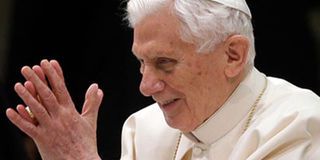An African Pope cannot be “wished”

Former Pope, His holiness Benedict XVI
Are the cardinals of the Roman Catholic Church ready to do the unthinkable and elect an African as the next Pope to succeed Benedict XVI? Many observers the world over think not though cannot completely rule it out.
A lot has been said and many wishes expressed ahead of the Conclave next month. The 117 cardinals will converge in the historic Sistine Chapel to elect the 266th successor to St Peter, who is officially the first and longest serving Pope whose ministry lasted 35 years.
Not a numbers game
Of these Cardinals, 62 are from Europe, Latin America (19), North America (14), Asia (11), Africa (11) and Oceania (1). With 28, Italy has the most electors while Europe tops at the continental level with 62. The College of Cardinals does not reflect the population; rather it reflects the power structure. Perhaps this explains why Brazil, the country with the largest Catholic population (160 million) has six cardinals yet Italy with a population of 57 million Catholics (96 per cent) has 28 Cardinal electors. Mexico follows Brazil in second place with 123 million Catholics (86 per cent) while the Philippines is third with 61 millions (81 per cent).
In Africa, DR Congo tops with 29 million Catholics (49 per cent), followed by Nigeria at 17 million (14 per cent), Uganda at 12 million (42 per cent), Tanzania -10 million (26 per cent), Angola -10 million (50 per cent) while Kenya is sixth with 8 million Catholics (24 per cent). The countries with the least number of Catholics in the world are Algeria with just 3,000 (0.1 per cent), Mauritania-at 4,000 (0.15 per cent), Djibouti at 7,000 (1.26 per cent), Niger at 16,000 (0.13 per cent) and Tunisia with just 20,000 Catholics (0.21 per cent) In Africa it is only Nigeria that will be represented by more than one Cardinal (2).
Race gives not mileage
Many Africans, including Ugandans, have been wishing for an African Pope this time around. Well, there is nothing wrong with Africans lobbying for a black Pope. There is a need, however, to appreciate that in the Catholic Church, racial considerations are never considered when making appointments. In this case, it is the Holy Spirit (Christians understand it) that is said to guide the cardinals during the conclave in choosing whom they see as the best candidate to lead the one billion Catholics in the world, irrespective of colour, continent or nationality.
There are many examples to show that there are no racial boundaries when it comes to the Catholic Church. In Uganda, for instance the Jinja Catholic diocese was for 40 years under late Bishop Joseph Willigers, an Irish. Late Italian Bishop Sisto Mazzoldi was for decades in charge of Karamoja diocese while in Kabale and Kampala other white bishops were for long in charge. Everything in such dioceses run smoothly without any indigenous Catholic raising a finger.
Not long time ago, Kampala Archdiocese was under Emmanuel Cardinal Wamala, whose home diocese is Masaka, 120 miles to the south. Likewise, the reigning man of God in Masaka diocese, Bishop John Baptist Kaggwa, was born in Lubaga parish (Kampala Archdiocese).
In the north, Gulu Archdiocese has never been under an Acholi bishop. At one time, it was Bishop Cyprian Kihangire, a Munyoro, but no Acholi expressed bitterness. Today, Archbishop John Baptist Odama is in charge here, but he is still not an Acholi, although he is from closer to home in Nebbi. In Fort Portal diocese, Batooro were once comfortable with Bishop Paul Kalanda (A Muganda from Masaka) as their shepherd for a long time. Before that Kalanda had served in Karamoja diocese.
A matter of history
In short, that is how the Catholic Church works. Even today, no African bishop or priest ever complains about a country like Italy having more cardinal electors than the whole of Africa. Perhaps one needs to be reminded that Christianity grew and spread in different parts of the world at different times. For instance, while Christians in Italy (part of the Roman empire) were being martyred and thrown to be devoured by lions in the Colossium as early as the 3rd century, the faith reached most parts of Africa around the 17th century. In the church history, only 59 popes of the 265 successors of St. Peter have been non-Italian.
In Uganda the first Catholic missionaries Fr Lourdel (Mapeera) and Bro. Amans arrived in 1879. This is one reason we cannot expect equal representation. This is far from a political cake where each country is expected to have an equal share, or like the United Nations where every member must have a vote in the General Assembly or the World Cup which every continent must now have a turn to stage.
Others have reasoned that it should be Africa because this is where the Catholic faith is fast spreading. Whereas this may be partly true, no one should forget that Latin America region has the biggest number of Catholics in the world. Brazil alone has 160 million Catholics.
Yet the region has never produced a pope, unlike Africa which has had three: St. Victor I, who was the 14th Pope, St. Militiades (the 32nd) and St. Galasius I (the 49th) all from North Africa. But if the next Pope is African, the continent should feel proud. At least he would have been chosen on merit.




